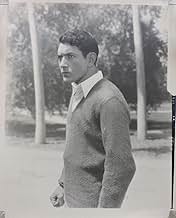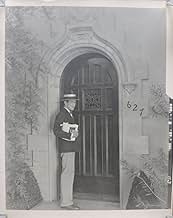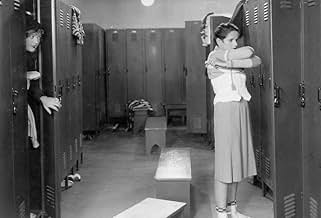Ajouter une intrigue dans votre langueMarion goes to college to pursue a handsome young man and discovers that he is coach of a women's basketball team.Marion goes to college to pursue a handsome young man and discovers that he is coach of a women's basketball team.Marion goes to college to pursue a handsome young man and discovers that he is coach of a women's basketball team.
- Récompenses
- 1 victoire au total
Lenore Bushman
- Co-Ed
- (non crédité)
Gordon Clifford
- Student
- (non crédité)
Lou Costello
- Extra
- (non crédité)
Mitzi Cummings
- Co-Ed
- (non crédité)
Morley Drury
- Football Captain
- (non crédité)
Dorothy Irving
- Co-Ed
- (non crédité)
Katharine Irving
- Co-Ed
- (non crédité)
Pepi Lederer
- Co-Ed
- (non crédité)
Alona Marlowe
- Co-Ed
- (non crédité)
Histoire
Le saviez-vous
- AnecdotesThe original Broadway production of "The Fair Co-Ed" by George Ade opened at the Knickerbocker Theater on February 1, 1909 and ran for 136 performances.
- GaffesDuring the opening credits, as the writing credits (second panel) are displayed, somebody wearing a hat ducked down and walked in front of the camera. (This may have been a common practice at the time.) But the person did not duck down far enough, and the top of the hat is just visible as it moves from left to right across the bottom edge of the frame.
Commentaire à la une
This is an old write-up based on a poor-quality copy of "The Fair Co-Ed" (so I'm not going to rate it), which has been circulating on the web and looks as though it were copied from an old VHS tape. Faces and the image in general appears bleached and non-intertitle writing within scenes (e.g. Letters and signs) were sometimes illegible as a result.
I haven't seen many of them thus far, but college-sports comedies seem to have been popular in the late silent era and age of early talkies. It was the Roaring Twenties, after all, and peace and prosperity led to increased college enrollment and an increase in the popularity of leisure activities such as sports. This one stars Marion Davies, who spends her freshman year at Bingham College chasing boys and playing basketball. Her academic record is addressed in only one punny title card regarding "passing." Get it--'cause basketball?
It was the times of Jack Dempsey, Red Grange, Walter Hagen, Babe Ruth, Bill Tilden and the horse, Man o' War. Besides the general reversal from the norm of these things, basketball, the subject of this film, wasn't yet a top-tier sport in terms of popularity. And, it's no wonder why after watching "The Fair Co-Ed." Personally, basketball is my favorite sport, but it was a very different game back in 1927. The jump shot hadn't been invented, let alone the NBA or WNBA, the shot clock, slam dunks or three-pointers. Instead, there were set shots, jump balls between every possession and more violence. Although not in the film, games were still sometimes played in cages. The knockabout humor here suites it. Besides the complete lack of any coherent plays (Coach Bob Dixon, the love interest of Marion, may be attractive, but he's a lousy coach), the film probably isn't that far off in its representation of the sport then.
Apparently, the students of Bingham take girls' hoops seriously, though. They throw a cultish pep rally, and the entire student body seems to turn against Marion when she quits the team. But, when she, of course, returns to help win a game, they celebrate with her again.
"The Fair Co-Ed" has most of the elements of the genre. Adults are grumpy, especially the dean, and they're always trying to dissuade the kids from having too much fun. There's dormitory and locker room gags, but nary a classroom to be seen. There's plenty of boys chasing girls, girls chasing boys, inappropriate relationships (i.e. Coach and student athlete) and general unruly behavior. A funeral service for their automobile license plates followed by a bizarre parade of various transportations employed by the students in response to the school's ban on the horseless carriage--also not that old of an invention at the time--is a highlight.
Additionally, the title cards were one of the reasons I watched this, as they were written by Joseph Farnham, who won the only Oscar for the category that year, although not for any specific picture. Anyways, they're plentiful here and provide much of the humor--full of snide insults, puns, slang and other wordplay. My favorite part, however, are the dialogue intertitles for a parrot.
I haven't seen many of them thus far, but college-sports comedies seem to have been popular in the late silent era and age of early talkies. It was the Roaring Twenties, after all, and peace and prosperity led to increased college enrollment and an increase in the popularity of leisure activities such as sports. This one stars Marion Davies, who spends her freshman year at Bingham College chasing boys and playing basketball. Her academic record is addressed in only one punny title card regarding "passing." Get it--'cause basketball?
It was the times of Jack Dempsey, Red Grange, Walter Hagen, Babe Ruth, Bill Tilden and the horse, Man o' War. Besides the general reversal from the norm of these things, basketball, the subject of this film, wasn't yet a top-tier sport in terms of popularity. And, it's no wonder why after watching "The Fair Co-Ed." Personally, basketball is my favorite sport, but it was a very different game back in 1927. The jump shot hadn't been invented, let alone the NBA or WNBA, the shot clock, slam dunks or three-pointers. Instead, there were set shots, jump balls between every possession and more violence. Although not in the film, games were still sometimes played in cages. The knockabout humor here suites it. Besides the complete lack of any coherent plays (Coach Bob Dixon, the love interest of Marion, may be attractive, but he's a lousy coach), the film probably isn't that far off in its representation of the sport then.
Apparently, the students of Bingham take girls' hoops seriously, though. They throw a cultish pep rally, and the entire student body seems to turn against Marion when she quits the team. But, when she, of course, returns to help win a game, they celebrate with her again.
"The Fair Co-Ed" has most of the elements of the genre. Adults are grumpy, especially the dean, and they're always trying to dissuade the kids from having too much fun. There's dormitory and locker room gags, but nary a classroom to be seen. There's plenty of boys chasing girls, girls chasing boys, inappropriate relationships (i.e. Coach and student athlete) and general unruly behavior. A funeral service for their automobile license plates followed by a bizarre parade of various transportations employed by the students in response to the school's ban on the horseless carriage--also not that old of an invention at the time--is a highlight.
Additionally, the title cards were one of the reasons I watched this, as they were written by Joseph Farnham, who won the only Oscar for the category that year, although not for any specific picture. Anyways, they're plentiful here and provide much of the humor--full of snide insults, puns, slang and other wordplay. My favorite part, however, are the dialogue intertitles for a parrot.
- Cineanalyst
- 9 juil. 2021
- Permalien
Meilleurs choix
Connectez-vous pour évaluer et suivre la liste de favoris afin de recevoir des recommandations personnalisées
Détails
Box-office
- Montant brut aux États-Unis et au Canada
- 485 300 £GB
- Durée1 heure 11 minutes
- Couleur
- Mixage
- Rapport de forme
- 1.33 : 1
Contribuer à cette page
Suggérer une modification ou ajouter du contenu manquant

Lacune principale
By what name was Le bel âge (1927) officially released in Canada in English?
Répondre






























